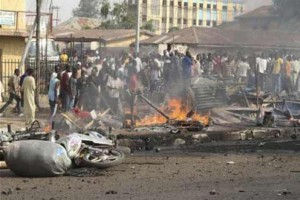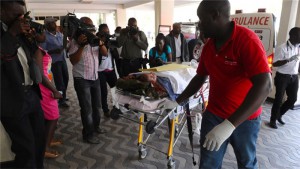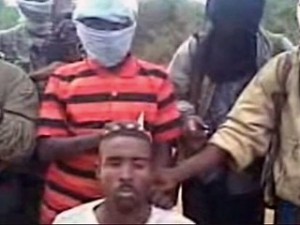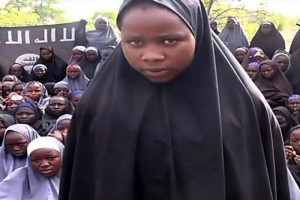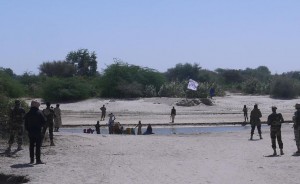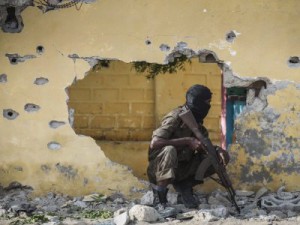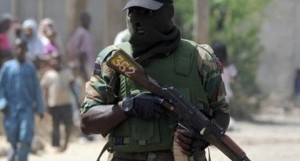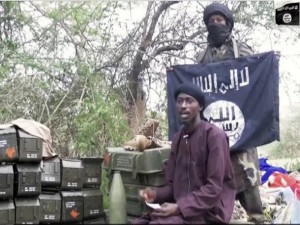The first of those actions was carried out by a woman, who exploded bombs she had attached to her body, causing wounds to five people in the Far North Region, said Minister of Communications, Issa Tchiroma Bakary.
12 dead in strike on Kenya hotel
An attack on a hotel in northern Kenya on Tuesday left 12 people dead and four others wounded, a Kenyan government official said.
Foreigners killed
Al-Shabaab beheading civilians after taking Somali town of Halgan
Al-Shabaab, the Somalia-based Islamic group, has seized the town of Halgan in the Hiran region after African Union peacekeepers pulled out and are said to be beheading civilians.
The peacekeepers, made up of 22,000 soldiers and police from African nations, (AMISOM) have been supporting Somalia’s government and army against the militant group since 2004, when the forces launched a military offensive to drive al-Shabaab out of major strategic centres.
Fighters from the al-Qaeda-affiliated group seized control of Halgan, a third town in central Somalia this month after the withdrawal of Ethiopian peacekeepers.
On 23 October, the African Union forces pulled out of Halgan, allowing al-Shabaab fighters to enter soon after, Abdiasis Abu Musab, the group’s spokesman on military operations, was quoted as saying by the BBC.
Reasons behind the contingent’s withdrawal is still unclear. Officials in Ethiopia were not immediately available for comment.
Residents are ‘beheaded’ in retaliation
Al-Shabaab are carrying out abuses against residents in retaliation, Dahir Amin Jesow, a local MP, was quoted as saying by Reuters news agency. “Each day, civilians are being beheaded over suspicion that they are government supporters,” he said. “We do not have a government that is effective enough to protect our civilians.”
Although the militant group has lost its grip on most of the country, there has been a rise in such attacks by al-Shabaab in recent times. In June, Al-Shabaab militants stormed an army base used by Ethiopian troops in Halgan town after ramming the entrance with a car bomb.
ibtimes.co.uk
83 ‘poorly equipped’ soldiers still missing following Boko Haram attack
At least 83 soldiers are believed to be still missing following an attack by Boko Haram terrorists in northeastern earlier in October. Army spokesman Col Sani Kukasheka Usman confirmed that “some” soldiers had gone missing and 13 were wounded during the attack, occurred in the Gashigar village, on the border with Niger, on 17 October.
Usman did not comment on the number of the missing soldiers missing, but some reports claimed they were at least 83.
On 23 October, officials told AP, on conditions of anonymity, that the soldiers were not able to counter the attack in Gashigar because they were poorly equipped.
This seems to be in contrast with a previous statement by Chief of Army Staff, Gen. Tukur Buratai, who claimed, on 19 October, the army had managed to “chase out Boko Haram members from Nigeria.”
The Nigerian government has been fighting against Boko Haram’s deadly insurgency for the past seven years. Soldiers have previously claimed they were sent to combat without proper equipment,
In October 2014, local reports claimed Nigerian soldiers had been injuring themselves to avoid deployment in Boko Haram-held areas.
Furthermore, at least 700 members of the Civilian Joint Task Force (CJTF) – created to help the army in the fight against Boko Haram – have been killed by the militants.
“Many of them had wives and many children. They had their aged parents who were part of their dependents, and who are now bereaved,”Jibrin Gunda, legal adviser to CJTF, told AP.
The Nigerian army is leading a regional offensive – consisting of 8,700 troops from Nigeria, Niger, Chad, Cameroon and Benin – against Boko Haram.
The offensive has scored some successes, such as the recapture of key territories and the recovery of arms and vehicles used by the terrorists during their attacks.
Although Nigerian President Muhammadu Buhari declared a technical victory over the fight against the insurgents in December 2105, Boko Haram still carries out attacks, with security expertswarning that underlying issues such as disenfranchisement, poverty and strong links with the Islamic State (Isis) will continue to pose major threats to stability in the region.
ibtimes.co.uk/
Buhari, Boko Haram and release of Chibok girls
Boko Haram escapee reveals the horrors of life with a terrorist group
A teenager who was snatched by Boko Haram has revealed the horror of being forced to live with the terrorist group.
Aminata*, 17, was taken by the Islamic group from her hometown Borno State in Nigeria two years ago and married off to an insurgent.
She had no choice but to live with the group who made her ‘witness terrible things.’
The following interview was conducted in a safe, protective location by a female UNICEF Nigeria Child Protection Officer on October 14.
This is the story of Aminata
I came in contact with Boko Haram insurgents in my hometown in Borno State, north-eastern Nigeria.
They saw me at my uncle’s house during their first attack on our town. I have lived with my uncle since I was two years old.
My biological father and family live in Cameroon.
Boko Haram invaded the town and convinced my uncle to join them. They also asked if there were any girls in his compound. They offered 1,000 naira for each girl.
I was sitting next to my grandmother when they dragged me to a car. They took me to an unknown location outside my town.
They had taken me and another 14 girls from my neighbourhood. I was held there for two months and then I was forced to marry one of the insurgents.
Before you marry an insurgent, you are a maid. You wash plates and cook for the insurgents. But when you get married, you become a wife and also focus on only him.
The ‘wedding’ had nothing. There was no clothing, no lotions, no creams, no presents.
It was just in my old clothes that I went to the house of my ‘husband’, which was just a hut with a room in it. That was where we lived.
And every time he wanted to have sex I refused, and then he would rape me and beat me up. I cannot count the number of times he has beaten me.
I lived there with the armed group for two years. It was a very bad experience. I have witnessed terrible things, including the slaughtering of women in a town by the insurgents.
They killed women who refused to marry them. Once they caught someone who had married another wife without telling them.
They buried him up to his head in the ground. Then they stoned his head until he died. It was a public punishment that we were forced to watch.
In some villages, when they attack, they steal cattle and sell it off before feeding their wives and children.
We didn’t ever have enough food. And any food we did get, didn’t have any condiments.
The insurgents have to steal food from villages or attack villages before we eat. They don’t have any food.
My insurgent ‘husband’ had three wives before me who had become suicide bombers.
But he decided he wanted me to remain as his ‘wife’. But two weeks later, he married another wife. I was very scared.
My ‘husband’ told me that if he decides or wants to, he will send me and my co-wife to town as suicide bombers. I was so scared.
Three days after that, I told one of the women that I was going to a nearby village to visit my grandmother. My ‘husband’ gave me three days for the visit.
I was with my grandmother in that village when the military arrived to fight the insurgents.
After the fighting, the military took me with them to Bama. I was in Bama with the military for a month before I was brought here.
My uncle and his brothers are still with the insurgents, and I have seen them carry out terrible acts, including killing people.
I really miss my family, and I wish I could see them again. We have been separated for too long. They live in Cameroon.
I sincerely hope that everyone who has been taken like me can leave Boko Haram and be reintegrated back into society.
My co-wife used to tell me to stop thinking about my parents, but she also said, “Don’t worry, you will find them one day.” I hope it is true.
I have been living as an IDP here in this camp for four months. I am pregnant. When I discovered I was pregnant, I was so unhappy, because it was my ‘husband’ who did it.
The pregnancy is very difficult for me. But people here in the camp have been kind. People ask me how I escaped, and when I tell them, they say “Thank God you escaped!”
It is good, because although people know I was with the insurgents, so far no one has treated me badly. I live with people from my LGA [local government area] here in the camp, and they understand and treat me well.
They have been very supportive. I only have a craving for certain foods which I cannot get here, and to see my family.
I hope to get married one day in the future. And to start a business. But, because I have never been in school, I cannot start doing that now, unfortunately.
I also want villagers who had to flee the conflict to remain here for a little while and not rush back to their towns and villages to resettle. We suffered there tremendously.
But I am still happy. I am extremely happy I am no longer with the insurgents. I want to thank all the people who have helped me. All I want now is to see my family again.
dailymail.co.uk
How several Nigerian soldiers drowned in River Yobe after Boko Haram attack
A yet unknown number of Nigerian soldiers drowned in the Yobe River in North-East Nigeria as they tried to escape intense fire from Boko Haram fighters on Monday, PREMIUM TIMES can authoritatively report.
Also, no fewer than 22 soldiers are currently recuperating in a hospital in neighbouring Niger Republic following the attack.
The troops were manning an outpost in Gashigar, Borno State, near the border with Niger, when hundreds of terrorists advanced rapidly towards them, forcing the troops to abandon their position with some diving into the nearby river, top military sources familiar with the development told PREMIUM TIMES Wednesday.
The Nigerian Army had on Tuesday distributed a statement announcing the assault on Nigerian troops, but blamed it on “escaping Boko Haram remnants.”
But a day after the statement, which was signed by Sani Usman, a colonel, details of what actually transpired on the battlefield that day and the reaction of commanders on the ground have been exclusively obtained by PREMIUM TIMES.
According to the security sources, the soldiers, attached to 145 Task Force Battalion, came under attack around 5:00 p.m. on Monday, but rescue operation did not yield result until the next day.
On that Tuesday, three rescue operations were carried out by soldiers from the neighbouring Republic of Niger operating in Ngarwa.
Around 7:00 a.m., they rescued the first set of nine Nigerian soldiers. At about 2:00 p.m., seven more were rescued. The last set of six troops was rescued around 5:30 p.m. in the River Komadougou Yobe, which empties into Lake Chad through Niger.
The troops, numbering 22, were dispatched to Diffa General Hospital in Niger. Two of them sustained gunshot wounds while the rest were said to have been rescued unscathed.
The casualty figure, including those who drowned, was yet to be determined as at the time of filing this report.
The sources said the troops have started recounting the incident to their superiors.
The soldiers said they were manning their post in Gashigar when they learnt that suspected terrorists, dressed in black and multi-coloured camouflage, were approaching in several utility trucks while chanting ‘Allah Akbar!’ (Allah is great).
“Troops then had to flee from their position because of their their inability to take on the terrorists in such a large number and firepower,” one of our sources said.
“The terrorists then began chasing them, and we learnt that many jumped into the Yobe River where some of them drown or get fatally shot by the attackers.”
The soldiers also said Boko Haram seized their armoured vehicle and set it alight.
But the sources said the military leadership might open an investigation into the attacks to establish the claims of the soldiers.
One source said some of the claims made by the troops were doubtful.
For instance, the commanders said it is difficult to explain how utility trucks were used to dispossess soldiers of their armoured vehicles especially when the soldiers said they were standing alert in their position.
The leadership also found it curious that the soldiers were rescued with their bullets still largely unspent.
“If they actually came under attack while they were fully at alert, then they should have exhausted their ammunition before taking to their heels,” the source said. “At least that much should be clear.”
Mr. Usman did not respond to PREMIUM TIMES’ requests for comments.
Nigerian troops are fighting alongside their counterparts from Cameroon and the Republic of Niger.
Monday’s development marked the first time in more than two years that Nigerian troops would come under superior firepower that required foreign military personnel to come to counter.
A similar incident last occurred in August 2014 when about 480 troops crossed the border into Cameroon while fleeing Boko Haram.
It also underscored the renewed vigour of the sect to launch major attacks on not just civilians but uniformed men after losing the huge swathes of land it once controlled.
Besides losing territory, the insurgents had also been largely decimated by the troops which experts said is responsible for their activities being whittled down across their stronghold in the northeast.
The insurgency, which began in 2009, has left approximately 20,000 people dead and displacement of millions.
Boko Haram leaders recently engaged in negotiation with the Nigerian government which led to last week’s release of 21 of the over 200 girls kidnapped from Chibok, Borno State, in April 2014.
premiumtimesng.com
Nineteen killed in fighting between army and al-Shabaab in Somalia
At least 19 people were killed Tuesday in fierce fighting between Somali and African Union forces and al-Shabaab militants, officials and witnesses said.
The allied troops launched a counter-attack against the radical Islamist group which had captured the town of Afgoye, 30 kilometres south-west of the capital Mogadishu, according to security officials.
A police station had earlier been targeted by a suicide car bomber, followed by militants who fought their way into the town’s neighbourhoods from different directions.
The insurgents deployed rocket launchers, mortars and heavy machine guns, said Ibrahim Najah, governor of Lower Shebelle province.
The fatalities included seven soldiers, eight militants and four civilians, according to local police officer Abdi Barre. Witnesses reported seeing bodies scattered on the streets.
“Fighting was under way until this evening to push insurgents out of parts of town they are still holding,” senior security official Mohamed Hassan said, adding that reinforcements were on their way to Afgoye.
Al-Shabaab said on pro-insurgent radio Andalus that it had captured the town and killed many people.
aboutcroatia.net/
Boko Haram overruns Nigerian Military base in Northeast
Nigeria’s army says Boko Haram Islamic insurgents have overrun a remote border military camp in the northeast, leaving 13 soldiers wounded and an unknown number missing.
Monday’s attack on Gashigar, on the border with Niger, is the third reported direct attack on the military after months of a lull during which the Islamic extremists hit soft civilian targets.
Army spokesman Col. Sani Kukasheka Usman called the attack a “temporary setback” committed by “remnants of Boko Haram” that forced the soldiers to retreat. He says an operation is in progress to find the missing troopers and “clear the Boko Haram terrorists at the general area.”
It is believed such attacks are the work of a faction of Boko Haram that calls itself the West Africa Province of the Islamic State.
ap.org
Boko Haram claims it killed 20 soldiers, steal military vehicles
Boko Haram has claimed it killed 20 soldiers in Borno state and wounded dozens of others in a fierce clash on Sunday, October 16.
The group released a statement released on Monday, October 17, using the name Islamic State West Africa Province (ISWAP). ISWAP is a faction of Boko Haram led by Abu Musab al-Barnawi as its leader in August.
The group claimed it “stormed a joint position of the armies of Nigeria and Niger” in the town of Ghashghar in northeast Borno state.
A community leader in the Ghashghar area said the Boko Haram militants took the soldiers by surprise when they fired rocket-propelled grenades.
“I was called by two of my contacts, informing of an attack late yesterday on the joint military personnel from Nigeria and Niger stationed in Asaka village, around 15 kilometres (nine miles) from Ghashghar,” the community leader who pleaded anonymity said.
The leader said he was told that the insurgents who came in eight vehicles launched an attack with heavy guns and rocket-propelled grenades on the soldiers.
He said the insurgents stole six military vehicles and weapons.
“The soldiers suffered huge casualties because they were taken off-guard. They never anticipated such an attack,” he added.
thebreakingtimes.com
- « Previous Page
- 1
- …
- 119
- 120
- 121
- 122
- 123
- …
- 229
- Next Page »
